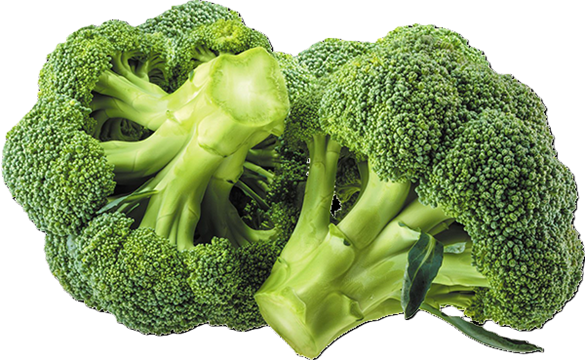🥦 Nutritional Profile of Broccoli
Broccoli is rich in essential nutrients that contribute to overall health:
-
Vitamins: High in vitamin C, K, A, and folate.
-
Minerals: Contains potassium, calcium, and iron.
-
Antioxidants: Packed with sulforaphane, lutein, and zeaxanthin.
-
Fiber: Supports digestive health and regularity.
A single cup of raw broccoli (approximately 91 grams) provides:
-
30 calories
-
2.5 grams of protein
-
6 grams of carbohydrates
-
2.4 grams of fiber
-
81 mg of vitamin C (90% DV)
-
93 mcg of vitamin K (78% DV)
-
567 IU of vitamin A (64% DV)
-
57 mcg of folate (14% DV)
-
288 mg of potassium (6% DV)
-
19 mg of magnesium (5% DV)
-
60 mg of phosphorus (5% DV)
-
0.66 mg of iron (4% DV)
-
43 mg of calcium (3% DV)
-
0.37 mg of zinc (3% DV)
🌱 Health Benefits of Broccoli
1. Boosts Immune System
Broccoli's high vitamin C content enhances the production of white blood cells, which are crucial for combating infections. Regular consumption can help reduce the risk of colds and other illnesses.
2. Supports Heart Health
The sulforaphane in broccoli has been linked to reduced inflammation and oxidative stress, both of which are risk factors for heart disease. Additionally, the fiber, potassium, and calcium content contribute to maintaining healthy blood pressure levels.
3. Promotes Digestive Health
Rich in fiber, broccoli aids in digestion by promoting regular bowel movements and preventing constipation. It also supports the growth of beneficial gut bacteria.
4. Enhances Skin Health
Vitamin C in broccoli supports collagen production, essential for skin elasticity and repair. Antioxidants like sulforaphane may also protect the skin from damage caused by UV radiation.
5. Aids in Detoxification
Broccoli contains compounds that support the body's detoxification processes, helping to eliminate harmful substances and reduce the risk of chronic diseases.
6. Regulates Blood Sugar Levels
The fiber and antioxidants in broccoli can help regulate blood sugar levels, making it a beneficial food for individuals with diabetes or those at risk.
7. Strengthens Bones
Broccoli is a good source of vitamin K and calcium, both of which are vital for maintaining strong bones and preventing osteoporosis.
8. Supports Eye Health
Lutein and zeaxanthin, antioxidants found in broccoli, play a crucial role in maintaining eye health and may help prevent age-related macular degeneration.
9. May Aid in Cancer Prevention
Compounds like sulforaphane and indole-3-carbinol in broccoli have been studied for their potential to reduce the risk of certain cancers by promoting detoxification and reducing inflammation.
🍽️ How to Incorporate Broccoli into Your Diet
-
Raw: Add to salads or enjoy as a crunchy snack.
-
Steamed: Light steaming preserves nutrients; drizzle with olive oil and lemon juice for added flavor.
-
Roasted: Toss with olive oil, garlic, and your favorite spices; roast until tender.
-
Stir-fried: Combine with other vegetables and lean proteins for a quick, nutritious meal.
-
Smoothies: Blend into green smoothies for an extra nutrient boost.
🧠 Conclusion
Broccoli is more than just a vegetable; it's a nutrient-dense superfood that offers a plethora of health benefits. From bolstering the immune system to supporting heart and digestive health, incorporating broccoli into your daily diet can contribute to overall well-being. Remember to enjoy it in various forms to maximize its nutritional value.


You must be logged in to post a comment.